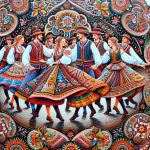
Several Polish writers have won the Nobel Prize in Literature, each offering something special to readers worldwide. Henryk Sienkiewicz was one of the first, known for stories that highlight Polish history and values.
Then there’s Wisława Szymborska, who wrote thought-provoking poems about life’s big questions. These authors and others like them have made significant contributions to literature, sharing stories and ideas that go beyond language and culture.
They make us think about who we are, what’s right and wrong, and how we connect with others. Isn’t it interesting how books can help us understand these universal themes?
Henryk Sienkiewicz: Pioneer Narrator
Henryk Sienkiewicz was a remarkable writer who combined his talent for storytelling with a deep understanding of history. He is best known for his novel ‘Quo Vadis,’ which accurately depicts the Roman Empire, demonstrating his extensive knowledge of history. In 1905, he won the Nobel Prize in Literature for his exceptional ability to write epic stories. Sienkiewicz’s work does more than just tell historical tales; it brings history to life, making it accessible and engaging for modern readers. Through his stories, he connects us with different historical periods, showing the importance of culture and nationalism.
‘Quo Vadis’ is a great example of how Sienkiewicz’s writing can transport readers back in time. He presents the Roman Empire in a way that is both informative and entertaining, highlighting the social and political issues of the era. This approach not only makes the story interesting but also educates readers about historical events and their significance.
Sienkiewicz’s ability to recreate history in his narratives allows us to experience the past as if we were there. His detailed descriptions and well-developed characters give us insights into the lives of people from different eras. This makes his books more than just novels; they are windows into the past, offering a unique perspective on historical events.
Władysław Reymont: Rural Realist
Władysław Reymont stands out in Polish literature for his exceptional depiction of rural life. He won the Nobel Prize in Literature in 1924, specifically for his insightful portrayal of Polish peasants. His most significant work, ‘The Peasants’ (Chłopi), spans four volumes and offers a detailed look into the lives of rural communities. This novel explores the seasonal changes and customs of the countryside, showing how people’s lives are deeply connected with nature. Reymont uses his keen observations and the ability to create relatable characters to weave a story that is broad in scope yet intimately detailed. This story not only brings to life the daily challenges and joys of the rural population but also touches on broader themes of perseverance, identity, and the human connection to the land.
Reymont’s work is important because it documents a critical time in Polish history—a period of change and modernization. Through ‘The Peasants’, readers gain a deeper understanding of how traditions and the natural environment shape human experiences. His narrative technique, focusing on the close relationship between the setting and the characters, makes the story engaging and enlightening.
For those interested in exploring the themes Reymont addresses, his novel ‘The Peasants’ is a great starting point. It not only offers a glimpse into a life that is far removed from the modern urban experience but also engages with universal questions of belonging, community, and the impact of change. Reading Reymont’s work can be like taking a step back in time and witnessing firsthand the rhythms of rural life. His ability to bring these elements to life makes his writing not just a piece of literature but also a valuable cultural document that continues to speak to readers across the world.
Isaac Bashevis Singer: Yiddish Storyteller
Isaac Bashevis Singer was a master at capturing the essence of Jewish life through his Yiddish stories. Unlike Władysław Reymont, who focused on rural Poland, Singer delved into the world of Eastern European Jewry. He used his stories to highlight the vibrancy and resilience of Jewish culture, tackling themes like faith, tradition, and identity as they clashed with the forces of a changing world. His stories are rich with the folklore and mysticism of his community, providing a unique glimpse into a way of life that was fading away due to historical events and the passage of time.
Singer’s skill in storytelling went beyond simply narrating events; he excelled in creating complex characters and engaging in deep moral explorations. This allowed him to capture the subtleties of Yiddish language and thinking, making his work a bridge between the traditional Jewish shtetl life and the modern world. Through his detailed and vivid character studies, Singer managed to preserve a critical piece of cultural heritage.
His literary achievements have not only celebrated an important aspect of human experience but have also secured him a prestigious place among Nobel Prize winners. By focusing on the specifics of Jewish life and using a clear, engaging style, Singer’s work continues to resonate with readers, offering insights into a culture marked by depth, resilience, and a rich history. His stories serve as a reminder of the power of storytelling in preserving cultural identities and exploring universal themes within the human experience.
Czesław Miłosz: Poetic Dissenter
Czesław Miłosz stood out as a major poet in the 20th century because he bravely spoke out against the harsh rule of totalitarian governments. He skillfully used his writing to fight for what he believed in: the freedom to think and believe freely. His work deeply explores right and wrong, asking tough questions about how personal beliefs fit with larger group ideas. For example, Miłosz’s poems often dive into the struggles of living under a regime that suppresses free thought, illustrating his points with vivid images and stories that bring the reader into his world of resistance and resilience.
Miłosz’s poetry does more than just criticize unfair governments. It also delves into themes like memory, being forced from one’s home, and figuring out who we are in a changing world. These topics didn’t just go against what oppressive governments stood for; they also made people think deeply about their own lives. His ability to write about these complex ideas in a way that feels real and immediate is one reason he’s remembered as a great poet. His work doesn’t just belong to the past; it continues to speak to us today, reminding us of the power of the human spirit to overcome difficult times.
In his writings, Miłosz provides a clear window into the challenges of standing up for one’s beliefs and the cost of freedom. For instance, his experiences as an exile and his reflections on identity offer a personal perspective on broader historical events, making his abstract ideas tangible. By sharing his own journey, he invites readers to consider their own positions in the face of adversity, making his poetry not only a historical document but a living conversation.
Wisława Szymborska: Philosophical Poet
Wisława Szymborska stands out in the world of literature as a poet who masterfully explores deep and complex ideas about life, death, and existence. Her work, which earned her the Nobel Prize in Literature in 1996, tackles these big questions with a mix of skepticism and amazement. What makes Szymborska’s poetry special is her skill in breaking down challenging philosophical ideas into verses that are both beautiful and easy to understand. This approach not only makes her poems accessible but also deeply meaningful.
Szymborska has a unique talent for observing the world around her and reflecting on it in her poetry. She writes about universal experiences, from the joys and sorrows of human life to the endless mysteries of the universe, in a way that speaks directly to the reader. For example, in her poem ‘The Three Oddest Words,’ she explores the concept of time and existence through simple yet profound language, making the reader pause and think about these everyday words in a new light.
Her ability to combine a critical eye with a sense of wonder allows Szymborska to create poetry that is both enlightening and engaging. Readers of her work are invited to explore their own thoughts and feelings about the world, inspired by her insightful perspectives. Szymborska’s poetry serves not just as a reflection of her own ideas but as a mirror for the reader’s own experiences and emotions.
Conclusion
Polish writers who have won the Nobel Prize in Literature have made a big impact on the world with their stories. These authors, including Sienkiewicz with his historical novels, Reymont’s stories about rural life, Singer’s tales in Yiddish, Miłosz’s powerful poetry, and Szymborska’s thought-provoking poems, show the wide range of human experiences and thoughts.
Their work not only shines a light on the depth of Polish literature but also shows how important stories are for us to understand and think about what it means to be human.






Comments are closed.